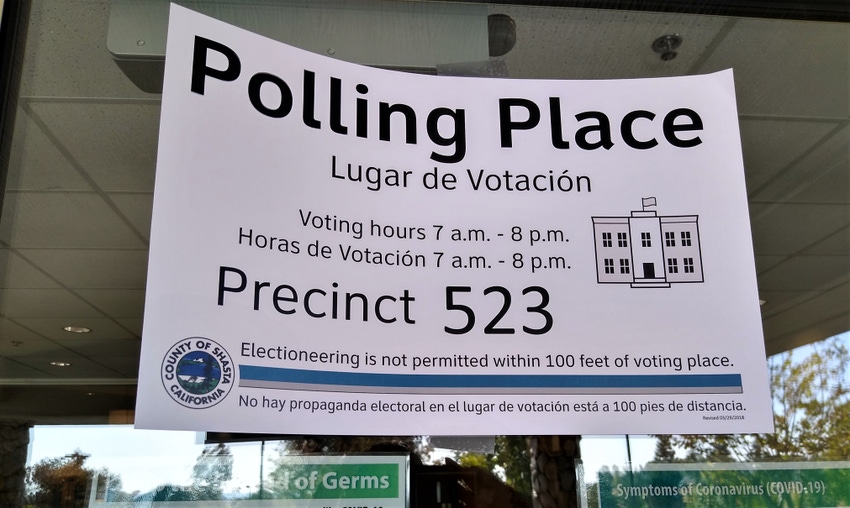
With votes still being counted, a controversial California tax initiative that drew the ire of the California Farm Bureau Federation and other agricultural groups appears headed to a narrow defeat.
Proposition 15, which would create a constitutional amendment to require commercial and industrial properties to be taxed based on their market value rather than their purchase price, had 48.3% support as of this morning, according to the California secretary of state’s office.
The measure trailed, 5,993,478 to 5,593,236, as of late Wednesday. With mail-in ballots still coming in, it could take a week or longer to determine the final outcome, the Associated Press notes.
“At this point we’re very pleased,” Fresno County Farm Bureau CEO Ryan Jacobsen said Wednesday. “The agricultural community in California ran an extensive campaign because of how much it affected our industry. I do think that made a difference to a lot of voters.”
The initiative would amount to a partial rollback of 1978’s Proposition 13, which set the property tax at 1% at the time of purchase and limited the annual adjustment to the rate of inflation or 2%, whichever is lower. The initiative applied to commercial and industrial properties as well as residential.
While proponents say the new measure would exempt properties zoned for commercial agriculture, groups including the CFBF, Western Growers and the Agricultural Council of California voiced their opposition.
The initiative’s critics within agriculture argue it would create some $12 billion in new taxes and trigger annual reassessments for fixtures – from irrigation or solar systems to permanent crop trees.
“This proposed tax hike, the largest in California history, is the one thing I’ve seen in the last few years where ALL of agriculture is on the same page,” Roger Isom, president/CEO of the Western Agricultural Processors Association in Fresno, said last month. “The industry is throwing everything we have against this.”
Supporters of Prop. 15, which include United Farm Workers co-founder Dolores Huerta, argued that large companies like Disney and Chevron shouldn’t enjoy the same tax breaks as the retired homeowners for whom Prop. 13 was mainly intended.
Representatives of both the “yes” and “no” campaigns told the AP they expect to prevail after all the votes are counted.
CFBF’s wish list
So far, the statewide Farm Bureau’s wish list appears to have been largely granted by voters. The CFBF supported Proposition 22, which retains independent contractor status for app-based drivers. The measure enjoyed 58.4% support late Wednesday.
While the initiative wasn’t directly agriculture-related, Jacobsen said the result highlights “the significant effects” from Assembly Bill 5, which restricts the use of independent contractors in a variety of industries.
“I think it shows the Legislature that this issue is not dead for a lot of individuals up and down the state,” he said. “The sweeping changes that AB 5 brought into California caused a significant amount of unintended consequences that were not overly thought through. The overwhelming support for that particular measure shows the electorate wants that issue fixed.”
The CFBF apparently helped defeat Proposition 18, which would lower the voting age in primaries to 17; Proposition 21, which would allow for rent control; and Proposition 25, which would eliminate cash bail. All the initiatives were opposed by the organization and trail by significant margins.
In setbacks for the CFBF, Californians overwhelmingly approved Proposition 17, which restores the right of vote after a prison sentence is served, and nixed Proposition 20, which would set parole restrictions for certain offenses. The Farm Bureau had sought a tougher stance against rural crimes such as theft, vandalism and trespassing.
In other agriculture-related initiatives, nearly 60 percent of Arizona voters passed Proposition 207, which allows limited cannabis cultivation while imposing a 16% excise tax on sales to fund public programs. Voters in Montana, New Jersey and South Dakota also approved marijuana for non-medical uses by significant margins.
Key congressman loses
Nationally, many in agriculture are expressing shock over the defeat of House Agriculture Committee chairman Collin Peterson, D-Minn., a longtime champion of agriculture. With Peterson’s departure and the House of Representatives expected to remain in Democrats’ hands, California Rep. Jim Costa is one of three in the running to become chairman. The others are Democratic Reps. David Scott of Georgia and Marcia Fudge of Ohio.
Costa, like Peterson, is known for reaching across the aisle, and he’s been a champion for San Joaquin Valley farms. Just this week, he led 111 of his colleagues in a bipartisan letter calling on President Donald Trump’s administration to make protecting common food and wine terms a priority in future trade discussions.
“There is the potential for Congressman Costa to play a significant role in agriculture,” Jacobsen said. “He not only understands valley agriculture, but he’s been in DC long enough that he’s part of the leadership on the agricultural side. Jim could be a very good advocate on the majority side of the House.”
This story has been updated.
About the Author(s)
You May Also Like






